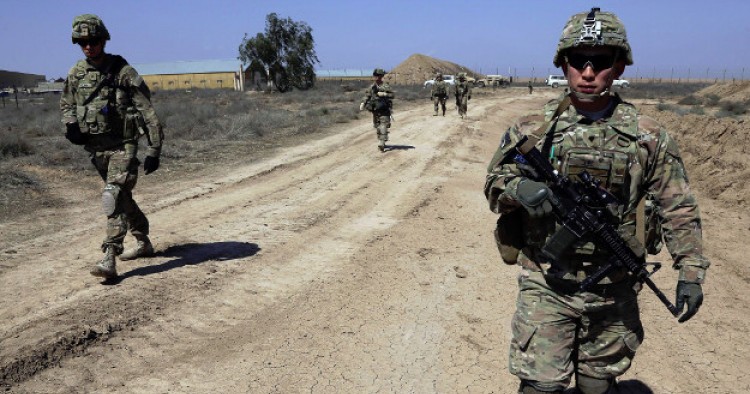A lengthy report in Fars News Agency (F.N.A.), an outlet close to the Islamic Revolution Guards Corps (I.R.G.C.), claims that the United States is seeking to contain the growing influence of Iran and its proxies in Iraq and Syria by increasing its military presence in northern and southern Syria and keeping American troops in Iraq beyond the fight against the Islamic State. The F.N.A. correspondent in Iraq adds that the Popular Mobilization Forces (P.M.F.) in western Iraq and the Bashar al-Assad forces and its allies in eastern Syria have stepped up efforts to bring shared border areas under their control. According F.N.A., the Islamic State controls 350 of the 612-kilometer-long shared border between Syria and Iraq.
The report further claims there are two key reasons the United States would prevent the Syrian Army and Iraqi paramilitary forces from seizing the control of the border regions from the Islamic State. The first reason, according to the report, is that the United States sees Deir ez-Zor Governorate as a strategic region and has a “devised a plan for it.” Secondly, the U.S. military stresses that the al-Tanf border crossing – which connects Syria, Iraq and Jordan – should be under its control. “Therefore, it is unlikely that Washington would allow the congruence of Hashd al-Shaabi [P.M.F.] and the Syrian Army along the shared borders of Syria and Iraq,” it predicts.
According to the FNA report, the latest P.M.F. operation in western Mosul is a “preemptive” move to foil the “U.S. calculations in western Iraq and northeastern Syria.”
Comment: Iran-controlled P.M.F. groups have played a central role in military operations against the Islamic State in Iraq and wield significant influence in western Mosul and surrounding regions. P.M.F. commanders recently claimed that the Baghdad government had barred the paramilitary forces from embedding with the Iraqi security forces in the ongoing operations to seize the strategic city of Tal Afar in western Mosul. They attributed the decision to pressure by the United States and regional Sunni states on the Baghdad government.
But P.M.F. has launched a parallel operation – dubbed Muhammad Rasulullah – in western Mosul with an aim to seize remaining regions that connect western Mosul to the Syrian border and are still under the Islamic State control. Iran and P.M.F. leaders claim that such a move would help cut off the Islamic State’s communication and supply lines between Syria and Iraq. But some Iraqis and regional Sunni states worry that Iran and its proxies are consolidating their presence to have influence over Iraq and Syria after the Islamic State is defeated. Other reports also suggest that Iran is attempting to establish a land corridor in Syria and Iraq for access to the Mediterranean Sea.
The Middle East Institute (MEI) is an independent, non-partisan, non-for-profit, educational organization. It does not engage in advocacy and its scholars’ opinions are their own. MEI welcomes financial donations, but retains sole editorial control over its work and its publications reflect only the authors’ views. For a listing of MEI donors, please click here.













